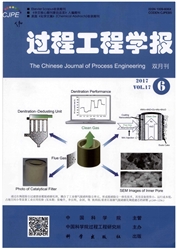

 中文摘要:
中文摘要:
综述了熔盐在电池(燃料电池、锂电池和热电池)、太阳能热发电等新能源领域的应用及其在生物质热裂解领域的研究动态,评价了熔盐为电解质的燃料电池的工作特点、转换效率和使用寿命,指出了熔融碳酸盐电池是燃料电池的发展方向.相对于高温固相法制备的锂电池正极材料,熔盐法制备的正极材料的晶体结构和性能得到改善.在太阳能热发电领域,高温熔盐作为一种低成本、高效率的传热蓄热介质得到了一定的应用.介绍了熔盐热裂解生物质制取生物油或富氢气体的过程,对比了熔盐组成、裂解条件对产物产率的影响,分析了热裂解机理和动力学,指出熔盐裂解生物质技术的可行性.最后对熔盐在新能源领域的应用存在的问题进行了分析,并对熔盐应用的发展方向进行了展望.
 英文摘要:
英文摘要:
The applications of molten salts in electrolyte cell (including fuel cell, lithium battery and thermal battery), solar thermal power generation and biomass pyrolysis are reviewed. The working characteristics, conversion efficiency and service life of fuel cells with molten salts are evaluated. It is also pointed out that the development of fuel cells will focus on molten carbonate fuel cells. Compared with the cathode material of lithium battery, prepared by high temperature solid phase method, the material by molten salt method is improved on crystalline structure and performance. And in solar thermal power generation field, high temperature molten salt as a low cost and high efficiency heat transfer and storage medium has been also applied. FtLrthermore, recent research progress in pyrolysis of biomass to bio-oil or hydrogen-rich gas in molten salt media is summarized. By examining molten salt composition and reaction temperature, and referring pyrolysis mechanism and kinetics, it is concluded that pyrolysis of biomass in molten salts is practicable. Finally, in order to enhance the development of molten salts application forward, problems to be solved are listed.
 同期刊论文项目
同期刊论文项目
 同项目期刊论文
同项目期刊论文
 期刊信息
期刊信息
